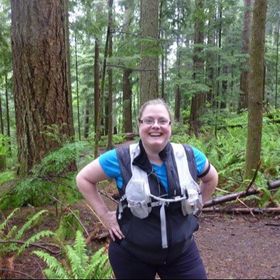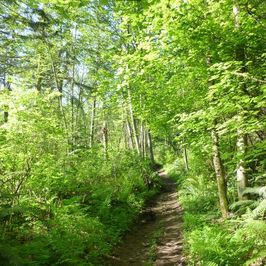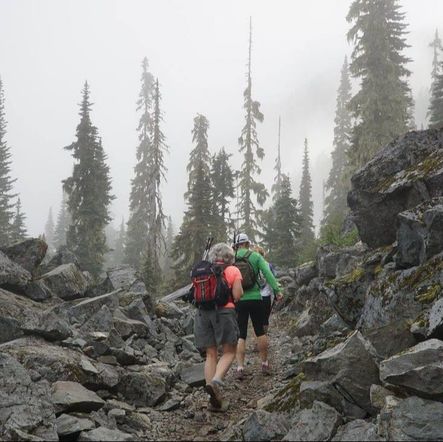 Yippie it is time for the trails!! Do you like to hike or trail run? Summer in the Northwest is our favorite time to hit the trails and go exploring. No matter what your fitness goals are, even if you don't think you are a trail runner or hiker, adding in a few trips to the trails (either running or hiking or both) can provide a host of benefits we bet even you have not realized. Cross TrainingWhile we typically emphasize that cross training should be no or low impact such as biking, swimming or pool running, there is a case for trail running being different enough from road running to warrant consideration as a fantastic cross training tool. First, we need to address the different types of terrain encountered in trail running. Trails can mean anything from a flat, paved surface to gnarly, boulder-infested cliffs. Typically, when we are discussing trails we mean a softer surface like packed dirt or finely crushed gravel. There can be roots and rocks and typically there are plenty of hills with many turns. Instead of a usual road run where you can easily predict your pace and you don’t need to be careful of your footing, running on what are called “single track trails” forces a different kind of running. It’s this difference that can bring a host of benefits to your workout. Benefits of Trail RunningWe admit it. We are biased! We think all runners should add trail running and hiking into their fitness routine. Strength: Single Track Trails are a great way to get a strength workout in without needing to be indoors at the gym. The change in terrain forces you to use stabilizing muscles in your entire body that don’t get worked in the same way during a basic road run. If you are not used to trail running, expect to be sore in unexpected places from your ankles, lower legs, glutes, core, and even your upper body. Running uphill is one of the best strength tools for a runner as it is muscle specific with resistance and don’t forget the big muscle group like your quads. The eccentric motion of running downhill can make you very sore but also very strong.  Non Repetitive: Overuse injuries are very common among road runners and these injuries crop up because road running is the same motion over and over again. This same motion equates to the same stress on ligaments, bones, joints and tendons over and over again. Trail running forces a lot of different motion up, over, and side to side. You constantly change up your gait to deal with the terrain and trail and this change can help provide a break. Nature: There we said it. There is something about just being out in a forest or a meadow which is rejuvenating and humbling at the same time. Use trail running for a mental health break and an opportunity for meditation while moving. It’s a time away from the screens and noise. There are many research studies coming out talking about the mental health benefits associated with being out in nature. Trail Running TipsShoes Do you need trail running shoes? You do not especially if you are first starting. Just using your regular road running shoes will be fine. Once you are regularly running on trails, it certainly won’t hurt. Look for a lugged sole which provides better traction over muddy, slick surfaces. Many trail running shoes come with a rock plate that provides a bit of protection from some of the larger chunks you’ll roll over. Note that even with trail shoes, you can still slip and fall. It is also convenient to have one pair of shoes solely dedicated to trails when it is really muddy. Just stomp around in a puddle or hose them off to get them cleaner. Distance v Time On a trail you can expect your pace to be much slower and have it feel much harder. It’s not a trick. Even for an easy paced trail run, you can expect your heart rate to be higher than it would be if you were running on roads. Don’t try and hit a particular pace when trail running. It’s a great place to practice learning effort. If you have a particular distance goal but want to run on trails, try calculating how long a road run of similar distance would take you and aim to run that long on trails. Gear/Fueling/Hydration Because trail running takes more effort and more time, plan to bring water and nutrition and eat and drink earlier than you would typically for a road run. This may require finding a small handheld water bottle, waist pack or running pack that you are comfortable having for a trail run. Everyone is different in what they like and prefer and works best for them and there are many options. Ask at your local running store for options! Form Trail running forces some changes in your running form. Typically, you will tend to land more with your foot under your body, take shorter steps and lift your feet higher. Try cueing the phrase “light on my feet” to remind yourself to pick your feet up. These form changes help you maintain stability and balance as you constantly shift your weight from foot to foot while dealing with changing trail terrain. Uphill Hill running pointers remain the same for trail running. With trail running, you may find some hills are just so steep that it makes sense to hike! If you notice your effort is too high planning to walk the steepest sections conserves energy. Keep powering forward. Downhill The only way to get better at downhill running is to practice it more often. The first time you run a longer time downhill, you may notice your quads and hip stabilizing muscles are sore! Stay focused, lean forward rather than back and keep your body relaxed. What's holding you back?Quite often we hear and see that runners are reluctant to try trail running and usually it stems from some key reasons. Time It does require more time to drive to trails and plan for a workout. Making a conscious effort to get out to trails on a regular basis is always rewarding. Hiking can also be a great family activity. We are lucky here in the Pacific Northwest that we typically have good access to trails year-round. Fear of Getting Lost/Safety Everyone’s comfort zone is different for this issue and safety is a priority for us too. Safety on roads is just as much as a concern as on trails although maybe in slightly different ways. On trails you will not be looking for oncoming cars but you will be looking for roots and rocks and possibly wildlife. With either trail or road you will be looking for turns and following directions or maps. There are several ways to work through this fear:
Falling Yes, this can happen but taking a fall is just as likely to happen from an uneven sidewalk during a road run. Trail running does takes more concentration and slightly different running form. Remember, “light on my feet.” And it can be slippery. As you fatigue mentally and physically, it’s easy to lose concentration and not react to obstacles as well so start out with shorter distances and less technical trails and build up to longer harder ones. Humbling Yes, trail running is humbling. Sadly, the reason many road runners never make it to trails is that they cannot handle the idea of how much slower they run. We use trails as a great way to check out of the daily grind of we must get this many miles in at this pace and never look at a watch when running on trails other than for the distance or time of day. We use trails as a way to play and remember part of why we run is to have fun! Trails are calling!Often trail running involves hiking. All of what we covered with trail running applies to hiking. It’s a great activity to do as a social activity and join some local groups and see different trails.
We hope we have inspired you to hit the trails. If you have never done it, give it a try. If you have tried it and are not quite sure – try again. And, if you are like us, come join us!
0 Comments
Leave a Reply. |
Categories
All
Archives
|


 RSS Feed
RSS Feed
